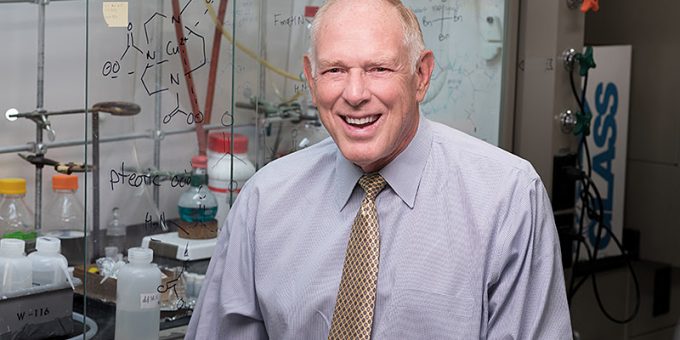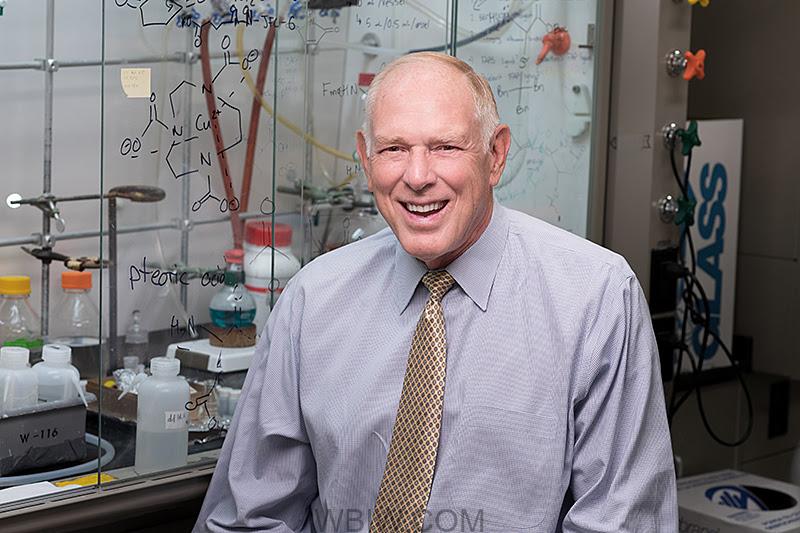
WEST LAFAYETTE – Prostate cancer is the second-most common cancer among American men after nonmelanoma skin cancer. According to the Centers for Disease Control and Prevention, it’s also among the leading causes of cancer deaths in men.
A new precision treatment that offers hope for patients with advanced prostate cancer has been granted approval by the U.S. Food and Drug Administration. In a Phase III study, it was demonstrated the treatment plus the normal standard of care had a 38% reduction in the risk of death compared with the standard of care alone.

Groundbreaking research from Philip Low, the Presidential Scholar for Drug Discovery, and Ralph C. Corley Distinguished Professor of Chemistry in the Purdue University College of Science’s Department of Chemistry laid the foundation for precision-targeted therapy. After his initial research, Low disclosed it to the Purdue Research Foundation Office of Technology Commercialization.
“I just feel blessed to have had an opportunity to work on meaningful projects throughout my career and even more blessed to have had an impact on one unnecessary source of pain and morbidity,” Low said. “I suspect that almost everyone knows someone who has suffered from prostate cancer, and it has been very rewarding to finally be able to impact this horrible disease.”
Purdue resources to commercialize intellectual property
Brooke Beier, senior vice president of commercialization at the Purdue Research Foundation, said the FDA approval of the precision-targeted therapy is one of the most meaningful approvals ever for a Purdue-related innovation. Several technology transfer professionals delivered on PRF’s mission by vetting, applying for protection, and licensing Low’s innovations.

“We are incredibly proud of Dr. Low and the overall Boilermaker contribution to the groundbreaking research and foundational intellectual property that paved the way for this precision-targeted therapy, and we are elated that it has obtained FDA approval,” Beier said. “PRF aims to improve the world through Purdue technologies and its graduates; this is a perfect example of achieving that mission. We are excited about the potential of this therapy to aid patients in their fight against advanced prostate cancer.
“The Office of Technology Commercialization receives over 400 invention disclosures from researchers each year and licenses over 200 technologies annually. We continue to search for commercialization partners for these technologies and work closely with them to support their efforts to translate the technology to the market to improve the world.”
Purdue’s research pipeline to discover and develop drugs
Low worked on this innovation at the Purdue Institute for Drug Discovery, where he was the inaugural director. The institute assists faculty in translating their discoveries into clinical trials with the ultimate goal of FDA approval. It currently supports more than 80 drugs in its development pipeline with 18 inactive human clinical trials.
Zhong-Yin Zhang, the current director of the institute, said, “I am very excited to see that the FDA has approved a second drug within the past year that was based on science developed in Philip Low’s laboratory within Purdue’s Institute for Drug Discovery. These approvals show the strength of drug discovery and development activity within the institute and at Purdue. The Institute for Drug Discovery is proud to support Philip’s and all our affiliated faculty’s work in moving their basic discoveries into life-saving medicines.”
The Purdue Center for Cancer Research (PCCR) has been a National Cancer Institute-designed basic research cancer center since 1978, one of only seven in the country. Timothy L. Ratliff, the Robert Wallace Miller Director of the center, is proud of the PCCR’s commitment to developing new treatments for cancers.

“The FDA approval of this drug is another success story about Purdue’s strengths in cancer research. Our dedicated focus on laboratory research creates the tools that others will use to treat cancer,” Ratliff said. “The foundation of these basic discoveries are researchers like Philip and their strengths in chemistry, medicinal chemistry, engineering, veterinary medicine, nutrition science, pharmacy, structural biology, and biological sciences.
“I am proud that the PCCR laid the foundation for the development of this first-in-class targeted radiotherapy not only through supporting the basic science but also through performing the first-in-human clinical trial that validated its ability to deliver agents specifically to prostate cancer cells.”
Philip Low’s other impact on drug discovery and development
On Nov. 29, the FDA approved another of Low’s innovations, a drug designed to help surgeons find ovarian cancer tumors and cells by turning them fluorescent green. Target Laboratories, which licensed the imaging agent through OTC, markets the drug with the brand name Cytalux.
Low also co-directed international research on Phase 2 clinical trial that showed a repurposed cancer drug was 100% effective in defeating malaria within three days.
About Purdue Research Foundation Office of Technology Commercialization
The Purdue Research Foundation Office of Technology Commercialization operates one of the most comprehensive technology transfer programs among leading research universities in the U.S. Services provided by this office support the economic development initiatives of Purdue University and benefit the university’s academic activities through commercializing, licensing protecting Purdue intellectual property. The office is housed in the Convergence Center for Innovation and Collaboration in the Discovery Park District at Purdue, adjacent to the Purdue campus. In the fiscal year 2020, the office reported 148 deals finalized with 225 technologies signed, 408 disclosures received and 180 issued U.S. patents. The office is managed by the Purdue Research Foundation, which received the 2019 Innovation and Economic Prosperity Universities Award for Place from the Association of Public and Land-grant Universities. In 2020, IPWatchdog Institute ranked Purdue third nationally in startup creation and in the top 20 for patents. The Purdue Research Foundation is a private, nonprofit foundation created to advance the mission of Purdue University. Contact otcip@prf.org for more information.
Information: Steve Martin, sgmartin@prf.org
Sources: Brooke Beier, blbeier@prf.org, Philip Low, plow@purdue.edu, Timothy L. Ratliff, tlratliff@purdue.edu, Zhong-Yin Zhang, zhang-zy@purdue.edu



